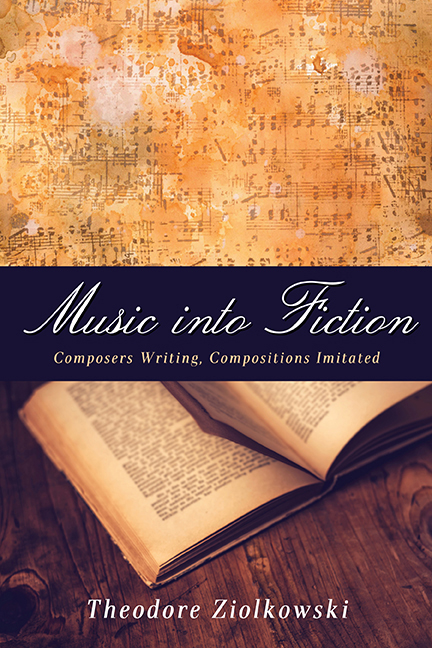Summary
What have we learned from our contemplation of Euterpe at those moments when she puts aside her flute to take up her pen?
We have not been concerned, let me reiterate, with moments of vague “musicality” in poetry, with the figure of the musician, with musical “ekphrasis” inspired by paintings, or with more theoretical explorations of “Music and Literature” that have been treated by other students of that interdisciplinary affinity as surveyed in the prelude. We have focused our attention here on two specific aspects that have been less frequently treated: musicians as writers, and fictional works that imitate specific musical forms or compositions. Our finale introduces an almost wholly unique phenomenon: musical works that seek to imitate compositions described in a novel.
The First Movement is framed by two writers, E. T. A. Hoffmann and Anthony Burgess, who initially regarded themselves primarily as practicing professional musicians until, in their early thirties, they turned to the literary careers in which they attained their reputations. And one of Hoffmann's successors, Robert Schumann, set out in his youth to become a writer but dedicated himself much sooner to his work as a composer. Their contemporaries Carl Maria von Weber and Hector Berlioz acknowledged their musical talents from the beginning but also displayed a strong inclination for writing. Did they share a common denominator?
Shaping their careers at a historical moment when musicians were moving up from the essentially secondary rank that still often characterized their social status during the age of Haydn, Mozart, and Beethoven, and at a time when music was still regarded widely as background noise, accompaniment for dancing, or entertainment for young ladies, these composer/writers of the next generation were determined to change things. They often established groups of like-minded friends—Weber's “Harmonic Society,” Hoffmann's “Serapion's Brethren,” Schumann's “League of David,” and Berlioz's “Petit Cénacle”—who shared the new Romantic esteem for aesthetic works of literature, art, and music. Meanwhile, in their satirical writings—Weber's Tonkünstlers Leben,” Hoffmann's Ritter Gluck and “Kreisleriana,” Berlioz's Evenings with the Orchestra, Schumann's dialogues of Eusebius and Florestan—they lampooned what they regarded as the pretentiously poor taste of most so-called music lovers and opera audiences of their day, in the hope of educating the public.
- Type
- Chapter
- Information
- Music into FictionComposers Writing, Compositions Imitated, pp. 222 - 226Publisher: Boydell & BrewerPrint publication year: 2017

